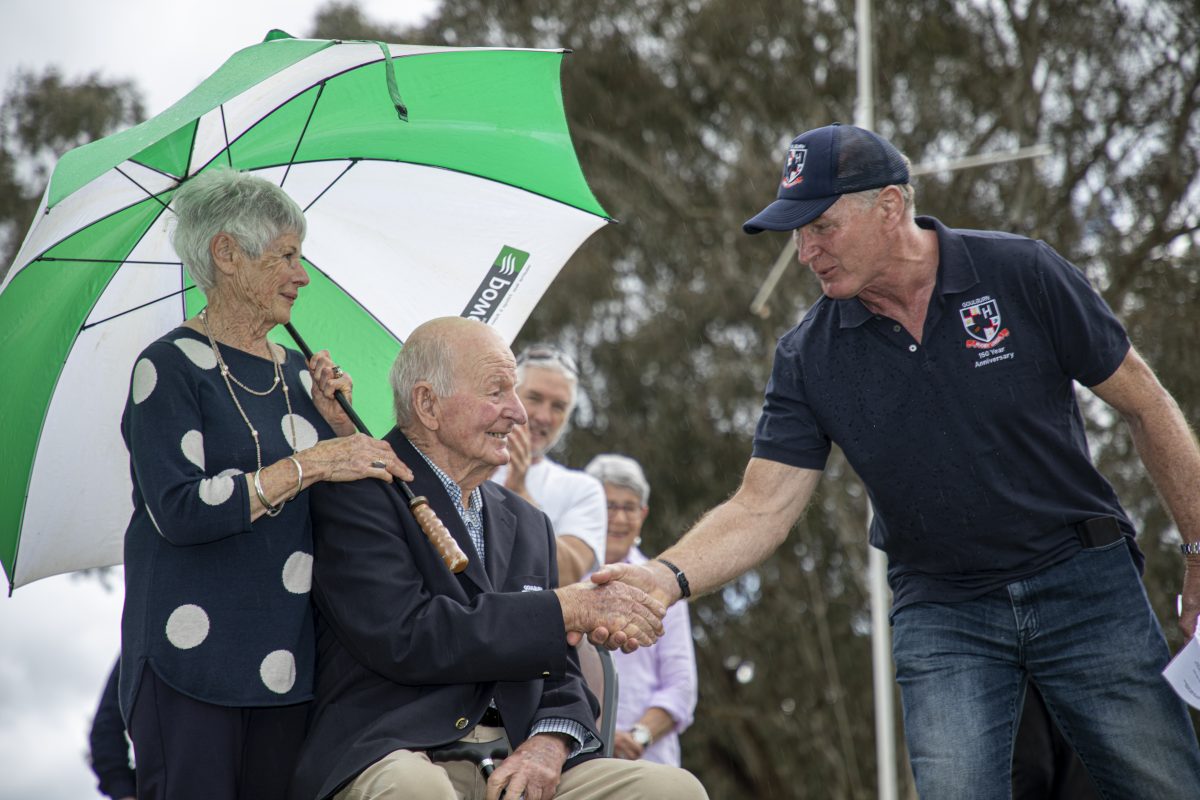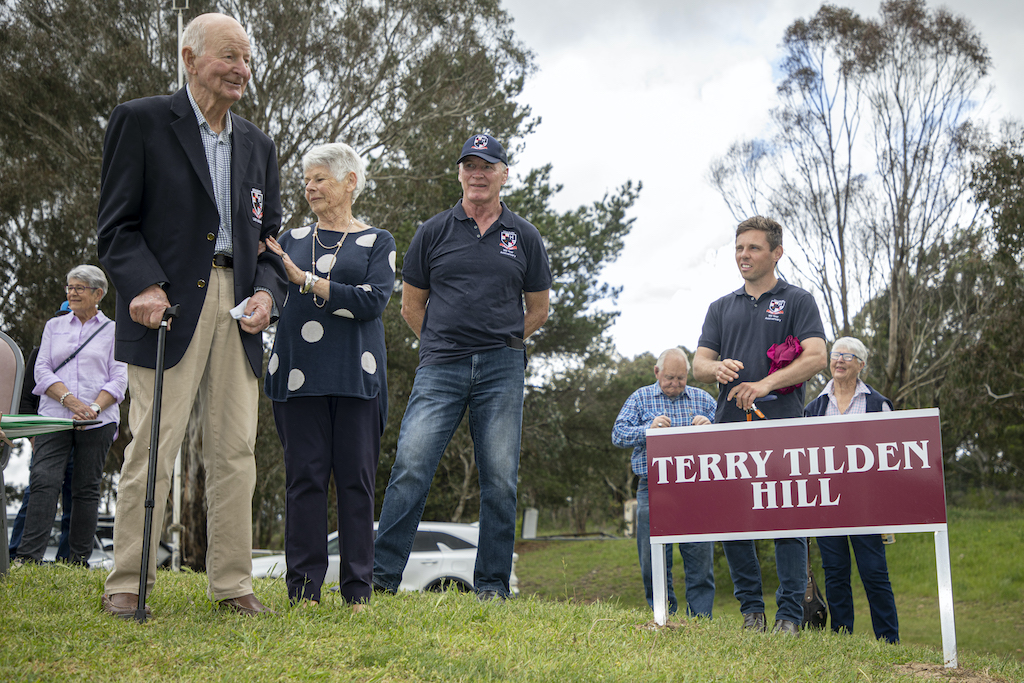
One of Goulburn’s Wallaby legends Simon Poidevin congratulates Terry Tilden on having the oval’s hill named in his honour. Photo: Peter Oliver.
Wallaby Simon Poidevin floored plenty of opponents in his playing days, and left another man bowled over on Saturday in Goulburn. This time it was off the field, overlooking the Simon Poidevin Oval, where the famous break-away unveiled the Terry Tilden Hill.
With his wife Margaret and children looking on, and in front of a large crowd celebrating the Dirty Reds’ 150th anniversary, Terry was visibly moved. At 84 he is the oldest living Dirty Red, and a life member.
An outside centre in his rugby union playing days, 62 years ago it was Terry’s brilliant performance as the lead in the Lieder Theatre’s musical Kiss Me Kate that attracted the attention of a Sydney theatrical company.
The dominant theatre company at the time, JCW was keen for Terry to leave Goulburn and try his luck in the big smoke because there was no doubt he had the talent. Instead, he married Margaret two years later and continued building the family’s dry cleaning business, turning his back on professional acting.
After 30 years in dry cleaning, he turned his back on that too. In his 50s, he wanted a new direction. He sold the business and bumped into Geissler Motors dealer principal Rod Owens at a Lilac Time Ball, who asked Terry what he had in mind for his future. He dismissed Rod’s suggestion of selling cars, and when the dry cleaning sale had been settled he and Margaret travelled to the Middle East and Africa.
Returning from holidays to Goulburn unsettled at not having a job, he went down to Geissler Motors to see Rod Owens. “I walked out of there with a job and couldn’t wait to get to work. I absolutely loved selling cars,” Terry said.
His first sale was a second-hand Ford Fairlane. “I always left them [his customers] flowers. I bought the flowers, it wasn’t Geissler Motors. I had an arrangement with the florist across the road and get a nice little bunch of flowers, leave it on the seat of the car with a thank-you note. If it was a bloke who didn’t mind a drink, I’d leave half a dozen stubbies.”
Terry’s persistence became noted, as a dealership magazine observed at the time: “Whatever it takes to make a sale these days Terry Tilden of Geissler Motors has it. A local veterinarian Graeme Collins penned this letter to the dealership.
“Dear Sir,
We have just taken delivery of a new Barina Trenz sold to us by one T. Tilden. This bloke cajoled us, threatened us, pleaded with us until finally we could stand no more and thought the easiest way out was to purchase the vehicle. He kept all and sundry entertained, the whole comical sales procedure was almost worth the purchase price. Pay this man more money!! (His threat to throw rocks on our dunny has nothing to do with this note).”

Terry Tilden, his wife Margaret, Simon Poidevin and Dirty Reds captain, co-coach and president Jackson Reardon on the Terry Tilden Hill. Photo: Peter Oliver.
Terry still laughs at the letter and is thankful he worked for the dealership. “Rod was a very good boss, he paid well and left you alone,” Terry said.
“After two years the car game fell over badly. I don’t know why, the economics at the time. While I was sitting there in the showroom trying to wrack my brain to stimulate another sale I thought to myself, ‘If I owned this place I wouldn’t need me. Sooner or later he [Rod Owens] is going to tap me on the shoulder’. I beat him to the jump.”
He left and found another permanent part-time job as a carer in the Brain Injury Rehabilitation Unit (Carrawarra House) at St John of God Hospital where he worked for 10 years.
“My role was carer, nothing more. If you came in with a brain injury and were a little out of it, I would help you do things that you would (uninjured) do automatically,” he said. He took residents shopping, dressed and showered some of them, learned to cook for them and worked on rotating shifts.
To fill in time during quiet night shifts, he did his daughter’s ironing. “She would bring in this whopping great basket of ironing and it would take me all night to iron it. And ironing wasn’t something I needed to learn, I’d been doing it for 30 years,” he said, laughing.
He bonded with most of the residents he met and was dismayed many of them were victims of assaults. “Eventually they would come around to me and I would make them laugh,” he said. “Sometimes I would sing them a song. One bloke, a radiologist from Canberra told me, ‘You would be a good man in a crisis’.”







